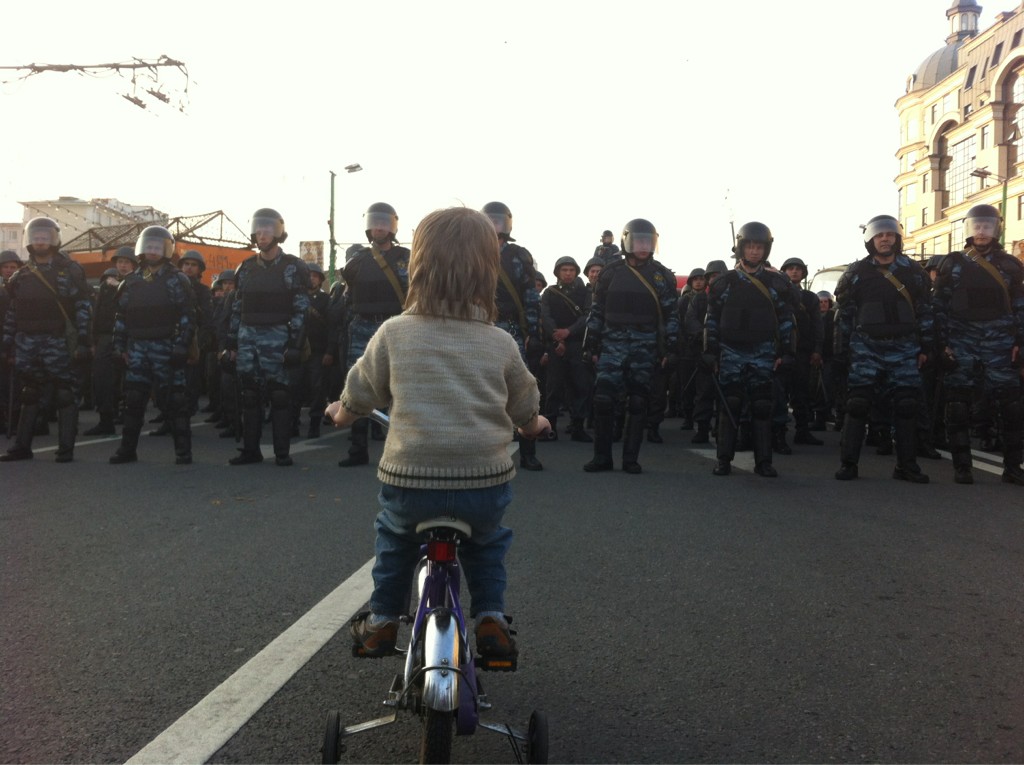Putin and the Bicycle
May 23, 2012 -
Josh Black
-
Bez kategorii

ioffe_pic.jpg
For most journalists, analysts and political actors, the most exhilarating possible moment is when a population who had previously been thought of as apathetic, quiescent and defeatist turns on its government. Russia after the December 2011 Duma elections is such a place. In Moscow, St Petersburg and Astrakhan, thousands have marched to protest against fraudulent practices, bureaucracy gaming the system and corruption. In March of this year their chief hope – “Rossiya bez Putina” (Russia without Putin) – was dashed and ever since, the opposition has been moving in smaller and smaller concentric circles.
New Yorker columnist Julia Ioffe has deemed that the image of the most recent wave of protests has been this child on a bicycle, facing a wall of special force policemen (OMON). Yet far from representing the tyranny of Tiananmen Square, this image reveals only the amateurism of the position the Russian opposition finds itself in; those opposition leaders willing to engage with the political system and those preferring to mobilise public opinion on the streets are the rear wheels, being steered into the clutches of the authorities.
The Waiting Game
It is easy to forget that the causes of these protests were elections. Only the hunger strike of Oleg Shein in Astrakhan provided a vestige of this original resentment and that matter is far from resolved. In the meantime, the Kremlin has played for breathing space and been exceptionally successful.
Some reforms have been introduced – not necessarily as insignificant as some say, in fact – but the repeated attempts to mobilise protestors has obscured the fact that not only will it take at least four years for these reforms to have effect (the date of the next Duma elections), but the Kremlin is already gaming the system by replacing governors in regions were the opposition is strong so that the new appointees’ terms will not expire for some time.
A House Divided
A neatly timed report from the Henry Jackson Society (PDF) surveys the Russian opposition and draws a distinction between the systemic (i.e. professional, organised and party-based) opposition with the looser affiliations that effectively planned the pre-Presidential election protests by webcam. The conclusions, drawn largely from interviews with the former group, are bleak. Political blocs will still be banned in the Duma and the threshold for electing deputies will rise from five to seven per cent of the vote.
Since the opposition has survived while refusing to confront its own diverse nature, this presents a problem. Almost half of the protestors voted for the liberal, pro-business Yabloko party, and yet, the hard-left Sergei Udaltsov is one of the protests main leaders. The founder of Yabloko, Grigory Yavlinsky (denied a place on the Presidential ballot due to “registration issues”) has decried the tendency of the opposition to “occupy” public spaces; saying, “Do they really think that you can achieve something through head-on collisions and civil war?”
One Way, Or Another
In some sense, many in the opposition feel that they can. Environmentalist turned protestor Yevgenia Chirikova, who was arrested along with journalist and Solidarity leader Ilya Yashin, has recently stated that:
"It is clear that a further escalation of the civil conflict in Russia is unavoidable, simply because society has outgrown being a semi-colonial, authoritarian, natural resource appendage to the developed world."
With Putin having been deemed to have been elected with just over a majority of the vote (albeit with an official return of sixty-five per cent), the opposition’s call for a re-run of the election seems futile. Fear of anarchy probably would tip the scales decisively in favour of Putin, with over half the population opposing calls for him to go in a recent survey. Moreover, the egos of many Russian opposition politicians would not allow for increased cooperation.
Nonetheless, The Henry Jackson report leans subtly towards the party politicians such as Ilya Ponamarev (A Just Russia) and Vladimir Milov (Democratic Choice), who have been interviewed more extensively and suggest advancing the interests of the opposition through existing political structures and political education. Alexei Navalny is on the record as stating that he hopes to bring the government directly to the point of entering a coalition with the opposition, similar to the Round Table in Poland.
In September 2010 a four-party coalition under the rubric of the Russian People’s Party (PARNAS) was formed, although Yabloko, A Just Russia and the Gary Kasparov faction of The Other Russia have declined to participate. Together, these parties would be more difficult to exclude from ballots and inspire greater confidence in the unifying powers of democracy, for Russians barely need reminding of the dangers of political intrigue.
Those who see the events of late 2011 and early 2012 as unique are forgetting that in 2006 and 2007 the Dissenters’ Marches organised by The Other Russia attracted upwards of fifteen-thousand people on several occasions but fizzled out soon afterwards. True, the governing party – United Russia – is weaker now, but it is not without resources.
The opposition in Russia has a mountain to climb, and it had better remove the stabilisers if it wants to be taken seriously.
To learn more about Julia Ioffe’s experience in taking the picture above see her post on the New Yorker blog.
Josh Black graduated in Modern History from the University of Leeds in 2009 and had his interest in Eastern Europe piqued by travels in Poland, Russia and Ukraine. He is starting an MSc in Russian and Eastern European Studies in September 2012.


































